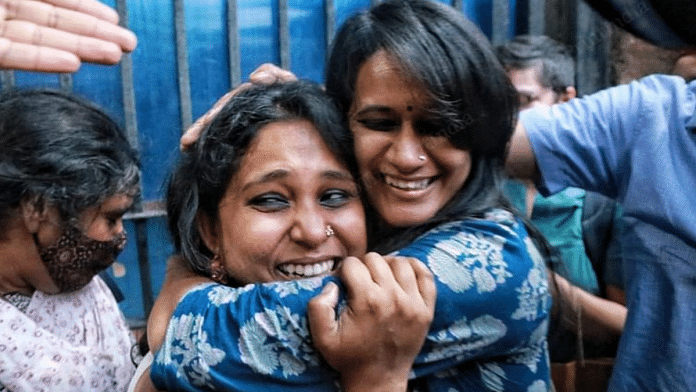New Delhi: The Supreme Court Tuesday dismissed the Delhi Police’s appeal challenging a 2021 Delhi High Court judgment granting bail to student activists Devangana Kalita, Natasha Narwal and Asif Iqbal Tanha, who are facing terror charges for their alleged involvement in the 2020 Northeast Delhi riots case.
A bench led by Justice Sanjay Kishan Kaul, however, clarified that the HC’s observations on the merits of the case and application of the anti-terror law — the Unlawful Activities Prevention Act (UAPA) — on the accused should not be treated as a precedent and may not be relied upon by any other accused in the riots case or any other proceeding.
On Tuesday, the top court noted that the impugned HC order had interpreted various provisions of the UAPA Act, while the only issue required to be examined in such matters is “whether, in the factual scenario, an accused is entitled to bail or not”.
“It is this argument which persuaded us while issuing notice on 18 June 2021, to observe that the impugned judgment shall not be treated as a precedent and may not be relied upon by any other parties in any other proceeding,” the court said after it rejected the Delhi Police counsel’s plea to adjourn the matter for the eighth time.
The three student activists were arrested in May 2020 and were accused of being “masterminds” behind the northeast Delhi riots that happened in February 2020. As many as 53 people were killed and 200 were injured in the violence that lasted three days.
The 15 June 2021 ruling of the Delhi High Court was delivered by a bench of justices Siddharth Mridul and Anup J Bhambhani. While releasing Kalita, Narwal and Tanha on bail, it had watered down the provisions under UAPA, holding that it should not be invoked to deal with criminal acts that squarely come under the Indian Penal Code (IPC).
The ruling also indicted Delhi Police for slapping UAPA charges against the three students for merely participating in protests against the Citizenship Amendment Act. Right to protest, the HC had said, was part of the fundamental rights and could not be bracketed as a “terror act” under UAPA.
Within three days, on 18 June 2021, the top court put the HC order on hold to the extent that the latter’s opinion on UAPA was made inoperative. The SC said the observations on the merits of the case “shall not be treated as a precedent and may not be relied upon by any of the parties before any court”.
In response to the Delhi Police appeal, the bench had then also described the 100-page judgment as surprising, troubling and having wide ramifications. It had also issued notice to the three student activists, asking them to give their response to the appeal.
‘No purpose in keeping this matter alive’
The idea behind such an order was to protect the state against the use of the “enunciation of law in a bail matter”. In view of the fact that the three have been on bail for almost two years, the bench said, it “sees no purpose in keeping this matter alive”.
The court also went on to clarify that its observation in the order not being cited as a precedent shall not come in the way of seeking parity by the other co-accused, asking for bail.
“If the co-accused is entitled to a plea of parity, that is for him to make and for the court to consider. We want to make it clear at the cost of repetition that the purpose of the interim order was that the expounded legal interpretations, in a bail matter, should not be utilised in these proceedings, either of the co-accused or any other proceedings,” the bench said.
“We make it clear that we have not gone into the legal proposition regarding the statutory interpretation, one way or the other,” it added.
Justice Kaul also observed orally that a bail order could never be cited as a precedent and, hence, it is not required to interpret the law. He faulted the lawyers for addressing the court.
“All this (interpretation of law) is arising because both sides’ counsel argue bail matters as if it’s an appeal against conviction or acquittal,” the judge commented.
The court declined indulgence to solicitor general Tushar Mehta’s request to set aside the HC judgment, which, in the solicitor’s opinion, was largely a personal view by the “learned judge (of the Delhi HC)”.
To Justice Kaul’s contention that lawyers argue bail matters as if they are arguing final prosecution in a case, Mehta said judges were also deciding bail petitions as if they were doing a final adjudication.
“In a bail (order), everything is being observed. The only issue to be considered is if a person is required to be enlarged on bail or not,” the judge said.
(Edited by Richa Mishra)



